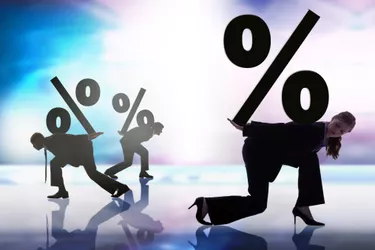
When looking for a competitive loan interest rate, the percentage of interest charged is not the only consideration. Most of the time, the lower the number, the fewer dollars you pay in interest; but this is not always the case. Several different factors make an interest rate competitive, and these depend largely on the type of purchase you are making.
Comparing the Numbers
Video of the Day
The first factor in a competitive interest rate is the number, which is usually presented as a decimal, for example, 11.9 percent. The lower the number, the lower the interest rate, which generally means you have to pay less interest before the loan is paid off. Most of the major banks have interest rate information online and you can comparison shop before you apply.
Video of the Day
How the Interest Is Compounded
With some loan plans, interest rates are compounded daily; others are compounded quarterly or annually. This can make a difference in the overall amount you pay back, even if all other factors are equal among the loan offers you're considering. Banks often compound rates daily if the amount borrowed fluctuates often.
Loan Terms

Higher interest rates that are guaranteed over a longer term -- for example, five years -- can actually save money over lower interest rates that are guaranteed for only a short term -- for example, one year. Interest rates fluctuate with the economy, and they can increase during the short term you've selected. If you plan to renew your loan, you may find that the new short-term rates are higher than the longer-term rates were before. In this case, a longer loan period with slightly higher interest can be more competitive than a series of shorter loan periods with interest rates that are initially lower. This is especially true if the long-term loan is guaranteed for a longer period than its competitors -- for example, seven years rather than five years.
Fixed and Variable Rates
Depending on your needs, you may want a "fixed" or "variable" rate loan. Fixed rates are usually higher, but they are guaranteed to remain the same for the length of the loan. Variable rates are usually lower, but if interest rates increase and your minimum payment remains the same, it will extend the term of your loan. On a mortgage, for example, this can be significant. When searching for the most competitive rate, compare within each category: variable rates with other variable rates and fixed rates with other fixed rates.
Flexibility
A low interest rate is good, but if you're tied into the term, it may be more advantageous to take a higher rate with more flexibility. Consider interest rate versus interest dollars. Interest rates apply to both the amount you borrowed and the time it takes to pay it off; interest dollars are the bills out of your pocket over the length of the loan. By accelerating your payments, you can decrease the interest dollars you pay even if the rate stays the same, which saves you money in the long run.